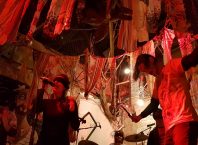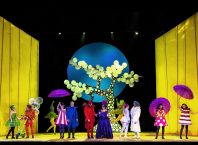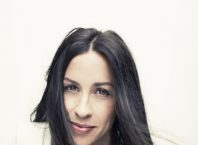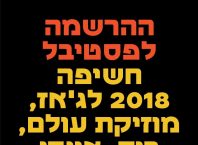“People tell me – it’s nice to talk to you but you don’t have a dramatic story,” says Bat-Ami Neumeier Potashik, spokesperson for Bat-Kol, the Israeli Religious Lesbian Organization, “but there are women who are lesbians and are afraid, I’ve taken it on as a bit of a mission, to be their voice.”
Bat Kol was established in 2005 by a group of women who understood that the challenges they face as religious lesbians are different and not all their answers can be found in the general movements. Today they number about 200 women, doubled since last year.
Talking about her personal experiences, Bat-Ami, who lives with her partner and their two children, says, “From the moment you have children, there are no more closets. It’s a choice that I made, and coming out of the closet was very easy. My family accepts me completely without any whys or buts… I have almost never encountered homophobia. Not only religious women encounter homophobia, secular lesbians have problems with their families too.”
Yet she feels that the experience of religious lesbians is unique in certain dimensions: “The most important thing [in a religious life] is to build a family and have children; it’s a mitzvah that is more important than others. The importance of the family, children, education, are central in the religious community. There is a very dramatic indoctrination for this in religious education, everyone undergoes it.”
“From some age – this is who you are. You dream about meeting a man who will understand you, will make you laugh, will be a good father. It’s not just a dream of religious girls, but our story has its own twists – he should be a scholar and devote time to study. And then you hear your friends talk about the boys they meet – and it bores you completely…but that wasn’t enough for me, I didn’t realize…and even if you do realize what it means, you don’t have anyone to talk to. You are the only one in the world to whom this has happened and no one can understand you.”
This sense of isolation, of being different and not having anyone to talk to, combined with the sense of loss; make the process of coming into one’s identity as a religious lesbian painful and traumatic. She emphasizes the fact that there will always be a feeling of loss, for the past self that is left behind, “I can’t at the age of 25 invent a new childhood dream for myself.” In recent months, during preparations for the gay pride parade, she discussed these feelings with friends, all now approaching their 40th birthdays, most involved in relationships and many with children, yet all recalled the initial feeling of loss and isolation: “We have partners and children but when I talked about these feelings, they all started to cry – it’s a very strong and painful place, this feeling of loneliness. A young woman who feels that she is alone in the world and no one can understand what she is going through.”
Bat-Ami and the other founders of Bat-Kol came of age in a time when there was far less mention in the media and the internet did not have the same presence in the lives of young people as is has today in Israel. Yet even today she points out that there is not much of a lesbian presence in the Israeli media and although the internet does provide access to information, “not everyone can sit at a computer and type: lesbian. Everyone can see what you are typing. A woman who used to work with my partner saw me on TV and that was how she learned that there are other religious lesbians. To get yourself to type the word, and search for “lesbian” on google, you need to undergo a process. You need to come out to yourself. That is the most difficult coming out – to yourself. To understand that everything you knew and thought about yourself is not true and everything that you hoped for yourself will not happen.”
Bat-Ami says that most religious lesbians have left their original communities: “I lived in Yeruham until 4 ½ years ago (had lived there since I was 18), in a community that was liberal and feminist, among people who define themselves as left-wing. I didn’t really present a challenge to them. When I met my partner, who lived in Tel Aviv, we decided to move somewhere in the middle. I think that my community in Yeruham would have accepted me with my partner.”
“I live without a religious community now,” she continues, “there are a few communities in Tel Aviv, but none of the women has grown up in these communities. One of our big dreams is that religious lesbians will be able to remain within the communities in which they have grown up.”
“A life within the community,” she explains, “is a large component of a Jewish religious life. Each one [referring to members of Bat-Kol] lives a life that she has created; it affects the way you keep the commandments. We have distanced ourselves and given up on this life. We are not looking for a Rabbi who will give us practical or spiritual guidance. We remember who we were and we know where 18 year old girls are today. Within the organization it is important for us to bring about change within the communities for women coming out of the closet today – so that they will not have to give up on their life in the community.”
Bat-Kol holds monthly meetings in Beer Sheva, Tel Aviv and Jerusalem, conducts study groups and has twice yearly Shabbat retreats. Other than participation in the pride parades in Tel Aviv and Jerusalem, most of their activities are directed inward, focusing on members and their needs. This year has marked a turning point, as the organization has grown and begun to look outward in terms of initiating change.
The starting point was from the sources – members of Bat-Kol studied the parasha in Numbers 9 where members of the community who were “unclean by reason of a corpse” were unable to perform the commandment of the Passover sacrifice. They brought their plight before Moses, saying “why must we be debarred” and a compassionate solution was found: “And the Lord spoke to Moses, saying: Speak to the Israelite people saying: When any of you or of your posterity who are defiled by a corpse or are on a long journey would offer a passover sacrifice to the Lord, they shall offer it in the second month, on the fourteenth day of the month, at twilight.” (Numbers 9:9-11 Jewish Publication Society translation)
Members of Bat-kol studied that parasha and saw a parallel to their situation. As Bat-Ami explains, “We cannot keep the important commandment of Genesis 2:24 “and they became one flesh.” We think that just as in the case of Passover a tolerant solution was found, one can be found for our situation as well.” To this end, Bat-Kol has made the suggestion of marking the 14th day of Iyar, the “second Passover” as a day of religious tolerance, which they marked this year by holding a seminar on the topic in collaboration with Kolech and Ne’emanei Torah Va’Avodah.
“Tolerance,” said Bat-Ami, “is not just a western liberal value, it is a divine quality of the Holy One, Blessed is He, and others should learn from it how to respond to all minorities.”
In the interim between this interview and its publication, the horrifying attack on the Tel Aviv gay center at Nachmani Street took place last Saturday, August 1, killing Nir Katz (26) and Liz Tirboshi (17) and wounding 15 others. “Children are always the soft belly of the community,” said Bat-Ami, “Some were still in the closet – family and friends did not know. This was their refuge, their safe place – and someone sought them out there to hurt them. We as adults, people who are in a safer place in our lives, we didn’t succeed in protecting them.”
The events have been a catalyst for action, inspiring meetings and rallies, as the community at large has had to face the reality that Israeli society is not as tolerant as it had appeared on the surface. “It has shaken everyone up from the foundations,” said Bat-Ami, “Even people who came out of the closet 20 years ago and have seen and heard everything…are reliving their past experiences, it has opened so many wounds for people – wounds that they had forgotten existed.”
Bat-Ami expressed her dismay at the expressions of hatred that have appeared since the attack saying, “There is a feeling that there is a dividing line of tolerance. People who were supportive have become more so and gone further to one side, and people who were against have also become more extreme and there is a chasm between the two sides that cannot be bridged.”
Bat-Ami translates her feelings of grief and frustration into words and action, continuing to write and speak on behalf of her community. It is important to her to emphasize that being a lesbian is more than a sexual preference: “Even today many people who consider themselves to be very liberal see it as a sexual preference. This enables Rabbis to say – I’ll help you solve this problem of sexual attraction. No one sees heterosexual couples as connected only for the sake of sex; people understand that there are a million other aspects to a relationship. It’s the same for us, just with a woman.”
“I think being a lesbian needs to be understood as an identity and not as sexual attraction. It’s who I am, it was determined at a very early age and it cannot be changed. This is how God made me.”





